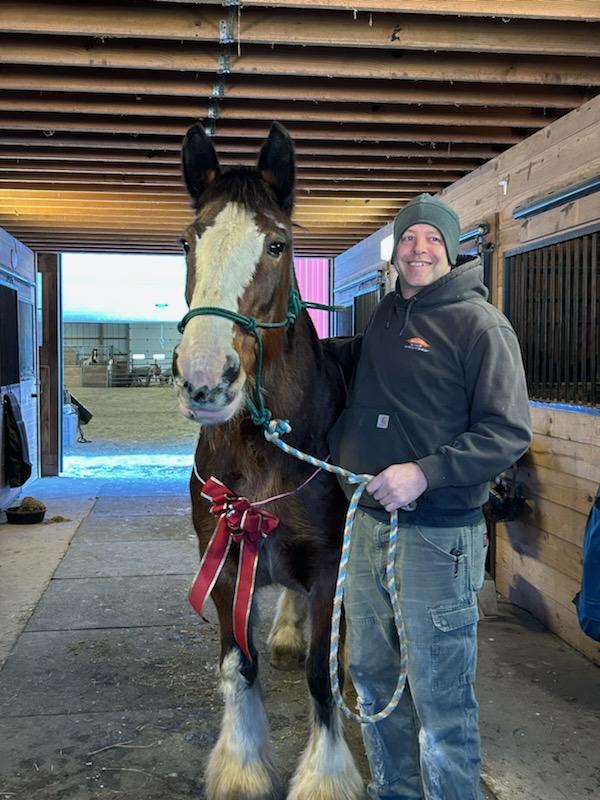‘I love my new life’: Local man celebrates almost 20 months of sobriety
“My recovery must come first, so everything that I love in my life doesn't have to come last.”
Harry Hall, 50, of Boothbay still tears up when he reads those words, which were printed on the front page of his inpatient workbook, part of his recovery journey after a 34-year-long battle with alcohol addiction. He still keeps them hanging on his wall.
"That was a change in my life right there, when I read that ... it means everything to me.”
According to a 2023 National Survey on Drug Use and Health (NSDUH), 28.9 million Americans ages 12 and older struggled with alcohol use disorder in the past year. Alcohol use disorder (AUD), also known as alcoholism, is characterized by the inability to stop or control alcohol use despite adverse social, occupational, or health consequences.
“Since the founding of our town, alcohol is and remains one of the most consistently dangerous drugs, readily available, easily accessible,” said Holly Stover, addiction outreach coordinator at Community Resource Council (CRC).
Stover said societal normalization is partly why alcoholism is harder to recognize and treat than other types of addiction; areas like the Boothbay region can be more impacted due to our tourism industry’s relationship with drinking culture, and how young people are exposed to it earlier due to summer jobs.
Stover also explained how alcohol alters brain perceptions. This makes it easier to use external stressors to justify the need to drink, while simultaneously making people believe they are doing better physically or mentally than they are.
“You don't see what you're doing to yourself until you do,” said Hall.
Stover said alcohol's status as a depressant means its stimulating effects (lowered inhibitions and increased energy) are also short-lived; and as those fun feelings slip away and negative emotions take their place, some people may start drinking more to recapture them. This creates a cycle of dependence.
“For that reason, it can go on a lot longer, be far more pervasive, and hurt the person and everybody around them so much more,” Stover said.
Hall’s tipping point came after he blacked out while attending a party with co-workers in Nobleboro. To this day, Hall doesn’t know what happened, but a family friend eventually found him on the side of Route One. The tip of his left toe had been ripped off, his knee filleted open.
“I kept drinking until like 5 in the morning (after I got home). Then, I tried to lay down in bed, and I was just looking at myself,” he recalled. His daughter didn't want to see him. He couldn't go back to work again (he had just returned after another alcohol-related injury) and something just clicked.
Later that day, family and friends disposed of his stash, and Hall went to detox at Togus VA Medical Center. That was on Sept. 7, 2023. He’s been sober since.
Alcohol-related health issues accounted for over 8.5 million emergency department visits from Jan. 2021 – Sept. 2023, according to the Substance Abuse and Mental Health Services Administration. In addition to the plethora of physical injuries Hall sustained over the years, prolonged alcohol consumption took a toll on his body in the form of high blood pressure, liver problems, weight gain and general aches and pains.
“When you drink too much alcohol, you don't absorb these micronutrients,” said Dr. Aquilino Alamo. This can contribute to dehydration, disruption to digestion, malnutrition and potent neurological effects. For example, deprivation of thiamin (vitamin B1) can lead to the development of Wernicke-Korsakoff syndrome, a brain and memory disorder that, if left untreated, impacts the ability to retain and create new memories.
That’s why it's important to maintain care after the decision to become sober to both treat short and long-term health effects, and gain tools for a new path forward. “The failure rate (of quitting) is very, very high if they don't have follow-up guidance with their primary care physician or (another) provider,” said Alamo.
Hall spent multiple weeks in intensive inpatient and outpatient care during his recovery. One crucial aspect was obtaining mental health support, which helped him work through past traumas that had contributed to his drinking.
“It's freaking hard, hard work. It's just a drive away to go buy a six-pack of beer right now, if I want, there's no one to stop me but me.”
However, Hall can’t imagine going back. Not only for himself but all the people who have supported him on the path to get where he is now, from his ex-wife and daughter letting him stay in their home while he waited for an inpatient bed to the family members who paid his bills. “Everyone has just been amazing. They're all so happy for me and proud of me. I’m proud of me.”
Part of this impactful experience was getting to work with his sister, Amy Reny, at Burke’s Island Farm. Every morning, he let out the horses, discovered their pleasant (and not so pleasant) personalities, and cleaned out stalls. Hall is employed now but still helps out five days a week. “It makes you feel alive, especially when I started riding.”
For his five-month sobriety anniversary, Hall got his own horse, a Clydesdale-Hackney mix named Dolly. That same year, he received a Sustained Recovery award after being nominated by the nurses at the VA.
Hall has no regrets about where life has taken him. There’s no point in looking back on what he could have done when he’s just grateful that he stopped drinking when he did. Otherwise, Hall’s not sure he would even be alive today.
“People do care about you, about me. It really boils down to loving your life, loving your friends and family, and loving everything else over alcohol.”
Resources:
CRC Addiction Outreach: (207) 350-7477.
Alcoholics Anonymous Hotline: (800) 737-6237




































